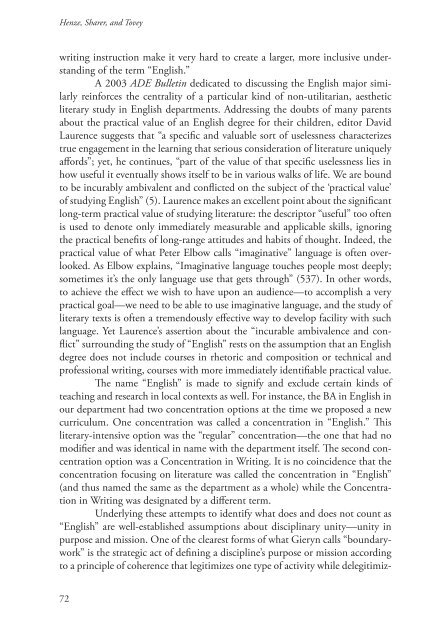Design Discourse - Composing and Revising Programs in Professional and Technical Writing, 2010a
Design Discourse - Composing and Revising Programs in Professional and Technical Writing, 2010a
Design Discourse - Composing and Revising Programs in Professional and Technical Writing, 2010a
You also want an ePaper? Increase the reach of your titles
YUMPU automatically turns print PDFs into web optimized ePapers that Google loves.
Henze, Sharer, <strong>and</strong> Tovey<br />
writ<strong>in</strong>g <strong>in</strong>struction make it very hard to create a larger, more <strong>in</strong>clusive underst<strong>and</strong><strong>in</strong>g<br />
of the term “English.”<br />
A 2003 ADE Bullet<strong>in</strong> dedicated to discuss<strong>in</strong>g the English major similarly<br />
re<strong>in</strong>forces the centrality of a particular k<strong>in</strong>d of non-utilitarian, aesthetic<br />
literary study <strong>in</strong> English departments. Address<strong>in</strong>g the doubts of many parents<br />
about the practical value of an English degree for their children, editor David<br />
Laurence suggests that “a specific <strong>and</strong> valuable sort of uselessness characterizes<br />
true engagement <strong>in</strong> the learn<strong>in</strong>g that serious consideration of literature uniquely<br />
affords”; yet, he cont<strong>in</strong>ues, “part of the value of that specific uselessness lies <strong>in</strong><br />
how useful it eventually shows itself to be <strong>in</strong> various walks of life. We are bound<br />
to be <strong>in</strong>curably ambivalent <strong>and</strong> conflicted on the subject of the ‘practical value’<br />
of study<strong>in</strong>g English” (5). Laurence makes an excellent po<strong>in</strong>t about the significant<br />
long-term practical value of study<strong>in</strong>g literature: the descriptor “useful” too often<br />
is used to denote only immediately measurable <strong>and</strong> applicable skills, ignor<strong>in</strong>g<br />
the practical benefits of long-range attitudes <strong>and</strong> habits of thought. Indeed, the<br />
practical value of what Peter Elbow calls “imag<strong>in</strong>ative” language is often overlooked.<br />
As Elbow expla<strong>in</strong>s, “Imag<strong>in</strong>ative language touches people most deeply;<br />
sometimes it’s the only language use that gets through” (537). In other words,<br />
to achieve the effect we wish to have upon an audience—to accomplish a very<br />
practical goal—we need to be able to use imag<strong>in</strong>ative language, <strong>and</strong> the study of<br />
literary texts is often a tremendously effective way to develop facility with such<br />
language. Yet Laurence’s assertion about the “<strong>in</strong>curable ambivalence <strong>and</strong> conflict”<br />
surround<strong>in</strong>g the study of “English” rests on the assumption that an English<br />
degree does not <strong>in</strong>clude courses <strong>in</strong> rhetoric <strong>and</strong> composition or technical <strong>and</strong><br />
professional writ<strong>in</strong>g, courses with more immediately identifiable practical value.<br />
The name “English” is made to signify <strong>and</strong> exclude certa<strong>in</strong> k<strong>in</strong>ds of<br />
teach<strong>in</strong>g <strong>and</strong> research <strong>in</strong> local contexts as well. For <strong>in</strong>stance, the BA <strong>in</strong> English <strong>in</strong><br />
our department had two concentration options at the time we proposed a new<br />
curriculum. One concentration was called a concentration <strong>in</strong> “English.” This<br />
literary-<strong>in</strong>tensive option was the “regular” concentration—the one that had no<br />
modifier <strong>and</strong> was identical <strong>in</strong> name with the department itself. The second concentration<br />
option was a Concentration <strong>in</strong> Writ<strong>in</strong>g. It is no co<strong>in</strong>cidence that the<br />
concentration focus<strong>in</strong>g on literature was called the concentration <strong>in</strong> “English”<br />
(<strong>and</strong> thus named the same as the department as a whole) while the Concentration<br />
<strong>in</strong> Writ<strong>in</strong>g was designated by a different term.<br />
Underly<strong>in</strong>g these attempts to identify what does <strong>and</strong> does not count as<br />
“English” are well-established assumptions about discipl<strong>in</strong>ary unity—unity <strong>in</strong><br />
purpose <strong>and</strong> mission. One of the clearest forms of what Gieryn calls “boundarywork”<br />
is the strategic act of def<strong>in</strong><strong>in</strong>g a discipl<strong>in</strong>e’s purpose or mission accord<strong>in</strong>g<br />
to a pr<strong>in</strong>ciple of coherence that legitimizes one type of activity while delegitimiz-<br />
72


















